A domain name is one of the first things you’ll think about when you get ready to start a blog. Once you have a solid idea for a blog, you can select the perfect name. But then, you need to register it. Enter: my guide to the best domain registrars on the market today.
Once you know what domain name you want, you might be wondering which domain name registrar you should trust.
Believe it or not, there are hundreds of domain name registrars out there, so picking the right one can be tough. Fear not, though. I’ve been in this space for over a decade, have done the research, and I’ve narrowed down this list to the very best domain registrars (where you’ll be able to get the cheapest domains without sacrificing any features).
Here’s everything you need to know, plus my recommendations for the top domain registrars, ranked and reviewed.
9 Best Domain Registrars of 2024 (Reviewed and Compared)
Disclosure: Please note that some of the links below are affiliate links and at no additional cost to you, I’ll earn a commission. Know that I only recommend products and services I’ve personally used and stand behind. When you use one of my affiliate links, the company compensates me, which helps me run this blog and keep my in-depth content free of charge for readers (like you).
What is a Domain Registrar and Why Should You Care?
So, what is a domain registrar, and what does it have to do with your blog?
Let’s start with the basics here because it can be confusing even for experienced bloggers.
First, a domain name is an address that people use to find your site, like ryrob.com. Domain registrars, then, are companies that register the domain name for you so that no one else can use it.
However, there’s a little more to it, so I’m going to give you some more information about domain registration so you can understand the process.
Understanding Domain Name Terms
Today, there are hundreds of companies that allow you to register your domain name. They’re called registrars.
There are a few terms in the domain registry community that are sometimes used interchangeably, but they all mean something a little different. The terms are: registry, registrar, registrant, and ICANN.
Let’s take a closer look at each term.
Registry
A registry is a generic top-level domain (gTLD) registry that maintains domain name extensions.
One well-known registry is Verisign, which is responsible for operating the common extension .com. They’re also in charge of regulating and enforcing requirements for their domain name extension.
Registrar
Registrars are responsible for selling domain names to registrants.
ICANN must accredit them to operate, but they have the authority to issue domain name licenses. Registrars work under registries and provide the actual domain names to registrants.
Registrants
Registrants are people or businesses that own a domain name. A registrant holds the rights to a domain name for a certain period.
ICANN
The Internet Corporation for Assigned Names and Numbers (ICANN) is a non-profit corporation that oversees the domain name system (DNS) and the Internet Protocol (IP) address, among other things.
ICANN gives domain registrars the proper accreditation and manages the launch of new gTLDs.
A Very Brief History of Domain Names
To understand how domain registration works, it’s helpful to look at the history of how it began.
Once upon a time, if you wanted to make a URL for your blog, you would go to one source.
The original domain name database became available to the public in 1986. It was run through ARPANET, which was a product of the U.S. Advanced Research Projects Agency.
The only problem was the original system wasn’t scalable, which is why a man named Paul Mockapetris, with the help of Jon Postel and Zaw-Sing Su, came up with what’s now referred to as the Domain Name System (DNS).
Instead of finding websites through an IP address (numbers), you could type in an actual name like Ryrob plus an extension to find the site.
Paul Mockapetris and his team introduced the first seven extensions, including very familiar ones like .com, .edu, and .net.
Once the DNS launched, it grew exponentially—so fast that a company was needed to distribute the names to registrants.
That’s when Network Solutions, Inc. (NSI) came into play. NSI was responsible for dispersing domain names to the public.
Domain name registration was largely unregulated at this time. By 1995, domain names were no longer free, and people were being charged as much as $100 for a two-year registration.
Some people felt the pricing was far too high, and the demand for regulations increased. That’s why the ICANN was born in 1998. ICANN has opened domain name registrations for other companies besides NSI.
At present, ICANN continues to oversee the DNS and strives to keep the Internet secure. Any reputable registrar must be accredited by ICANN to sell domain names.
Now that we’ve covered the history of domain names let’s look at some of the things you should consider when choosing where to register your domain.
How to Choose the Right Domain Registrar
So, what do you need to take into account when choosing a domain registrar?
Is it better to register your domain name with a different company from your web host … or does it make more sense to have everything in one place?
Let’s take a look at everything you need to know.
Things to Consider About Domain Registrars
Choosing your domain name is an integral part of the start-up process of your blog.
It’s your address — where people can find you on the internet. The domain registrar you choose is also important because not all registrars are equally made.
Some registrars are of higher quality, offer more services, and are more reputable than others. Plus, some come at a heftier price tag.
Here’s a quick list of the most important things when searching for a domain registrar.
- Price
- Privacy
- Customer Service
- Limited Upsells
- Hidden Fees
- Reputation
- Ease of Use
- Available Extensions
Let’s take a look at each of those areas in turn.
Price: What Will You Pay Each Year for Your Domain Name?
Your domain name will cost you nothing unless you buy an existing domain name from the owner (which can get really expensive).
Assuming that your preferred domain name is currently unregistered and available, it’s likely to cost you between about $2 and $50, depending on the domain extension you want to use.
Generally, .com domain names will cost about $10 to $15 annually. It varies a bit between domain registrars, and you can often get good deals for your first year.
If you want a more unusual domain extension, it’s worth shopping around, as you may find that some registrars are a lot cheaper than others.
Privacy: WHOIS and Privacy After Domain Registration
If you’re not familiar with registering domain names then you may not know some of the privacy concerns associated with it.
Basically, when you register a domain, your personal information is added to a database known as WHOIS.
This database includes information on every domain on the internet, and your domain name registrar is responsible for adding the information to it.
If you want to know more information about a particular domain, you can do a quick search at WHOIS.com.
The database will let you know if the name is available, who the registrar is, when the domain name was created when it will expire, and more.
When you sign up for your domain, your personal information also goes into that database. So, in theory, if someone were to look up your domain name, they could learn your full name, email, phone number, and address.
Fortunately, your information doesn’t have to be made public.
There’s something called WHOIS privacy protection, and it’s important to make sure the company provides this service. Some will provide it for free, but others will charge you for it.
Customer Service: Can You Get Help if You Need It?
Normally, the process of registering (and renewing) a domain is straightforward. But it’s still worth going with a reputable company that offers strong customer service.
You may want to Google the name of the registrar plus “reviews” to see what people are saying about them.
It’s also a good idea to look on the registrar’s “Contact” page to find out how easy it’ll be to contact customer support during the times that you’ll be working on your website.
This is especially important if you’re looking at using a web host that offers domain registration, as you’ll likely need support at some point when building your website.
Limited Upsells: What is a Domain Name Registrar Upsell?
Have you ever made a purchase online only to receive excessive emails later about other recommended products or services?
This is called upselling and it’s the kind of thing that some registrars do. There are many strategies for upselling but the main goal is always to make as much money as possible from their customers.
One way most domain registrars will try to upsell is by asking you to purchase more than one year for your domain name.
You may only want to purchase your preferred domain name for one year, but they’ll likely want to lock you in for a few more years.
This isn’t necessarily a bad thing since you’re likely to use your domain for a long time, and you’ll usually get it at a better rate.
But if you’re just getting started with building a website, it’s important to know that, with most domain extensions, you don’t have to register for more than a year upfront.
Other types of upsell include:
- Buying additional domains
- Additional domain extensions
- Signing up for hosting
- Privacy protection
- Email services
- SSL certificates
- Website builders
- SEO consultation
- Website marketing
- Sitelock
The company might ask you about these services while you’re signing up, or they may begin sending you emails promoting additional services.
The main thing here is to avoid working with companies that aggressively try to upsell you on products or use deceptive tactics to make you purchase things you don’t really want or need.
If the services are something you think you’d actually use, then you can take advantage of bundled prices. If not, don’t hesitate to turn down a service you don’t need.
Hidden Fees: Are You Paying More Than You Expected?
Along with upsells, some domain registrars add on hidden fees that aren’t obvious when you’re first looking at the price of a domain.
These can include fees for domain privacy, which some hosts charge and others don’t. This isn’t generally an unreasonable fee … but it’s still important to be aware of it.
Another common type of hidden fee is when the domain registrar has a great first-year offer on a domain: perhaps you can get it for just $0.99. But after a year, you’ll find the cost to renew is much higher.
Always check out the regular cost, not just the sale cost, when purchasing a domain, so you know what you’ll be paying in the future.
Reputation: Why Your Domain Name Registrar Reputation Matters
When choosing a domain registrar, always pick a reputable company, and here’s why.
In March 2019, a registrar known as AlpNames went down for over a week. Registrants lost access to their web addresses, and the company seemingly went dark.
At the time, they had registered over 700,000 domains. ICANN acted quickly and removed their accreditations.
They then migrated the domain names to a new registrar. It’s good news that people didn’t ultimately lose their domains, but it was a huge hassle that could have been avoided.
This particular company didn’t have a great track record, and in fact, ICANN had already made several reports about the company.
While this example is rather extreme, it does show that not all registrars are worth investing in.
There are other things to watch out for with less than reputable companies. They may not have your best interests in mind when it comes to the way they do business.
Shady or untrustworthy registrars might engage in:
- Domain slamming: This term refers to the practice of sending fake renewal notices to registrants. The fake notices are actually a scheme to illegally transfer the domain to a different registrar.
- Charging a “transfer-out” fee: There may be something in the fine print of your domain registrar agreement that permits them to charge you a fee if you transfer your name to another domain registrar.
- Hidden fees: Even well-known companies will sometimes try to hit you with hidden fees and extras. These fees may be hidden in the terms of service
- Information sharing: Some domain registrars will sell your information to third parties.
- Difficult to understand costs: It’s best to find domain registrars with transparent costs. Otherwise, you might choose a company because they have low introductory rates, only to be hit with much higher costs when it is renewed.
Don’t let this worry you, though. Most domain registrars are well-regarded companies that act ethically. In a moment, I’ll come to some that I recommend: all of these are trustworthy and won’t rip you off.
Ease of Use: How User-Friendly is the Domain Registration Process?
Most of the best domain registrars are straightforward to use. After all, they want as many customers as possible!
If you start signing up with a registrar and find their process unnecessarily complicated, you might want to pick a different one.
Remember, you’ll want to renew your domain in the future, and you may need to change your domain name settings.
Available Extensions: What’s the Best Extension For Your Domain Name?
Generally, .com is the go-to extension. It’s the most memorable and the most common.
It’s also reputable, and people won’t question its trustworthiness the way they would with an unusual extension. Every domain registrar should offer .com domains.
However, there are times when other extensions make sense.
- Using a country-specific domain extension can help to attract local business
- .org is a well-recognized extension usually used by non-profit organizations
- .tech is growing in popularity for tech websites and startups
- .app is the fastest-growing extension — used for apps and app developers
There are loads of other choices as well, ranging from .pizza to .space to .hospital. In my review below, I’ll only show prices for .com extensions since they are the most commonly used.
Do keep in mind if you have an alternative extension in mind, it’s a good idea to shop around (or try using a domain name generator to come up with the right name for your idea).
Extension prices can vary greatly from one domain registrar to another, and not all extensions are available from all registrars.
Pros and Cons of Bundling Your Domain With Your Hosting Company
Before we get into our list of the best domain registrars, let’s take a look at one key question: should you get your domain name from your web hosting company?
There are quite a few hosting companies that bundle your domain name with the cost of your hosting.
While this sounds like a good way to save some extra dollars, not every hosting company is good as a web host and as a domain registrar.
Cons of Bundling Your Domain With Your Hosting Company
There are a lot of good reasons to use a registrar separate from your hosting company. Some reasons not to bundle include:
- Extra hassle if you ever want to leave your hosting company
- Your hosting company may not provide a quality service for domain names
- You want more than one domain name
- You want to bundle domain name purchases for a better price
I highly recommend avoiding free blogging sites that include a branded free domain name.
What I mean is that platforms like Wix, Weebly, and WordPress.com offer limited free plans.
You can run your blog for free (no domain name purchase necessary), but you won’t have the right to access your blog.
You’ll also have to put up with branding from the website platforms. For example, instead of your website URL reading: yourname.com, with Wix, it would be: username.wixsite.com/siteaddress
The reason? You’re getting a free place to host your blog, but you’re also getting all their branding. Your URL is not clean and easy to remember. It doesn’t look professional, and it isn’t easy for your blog visitors to remember.
Instead, I recommend purchasing a domain and choosing a great hosting company like Dreamhost or Bluehost.
Pros of Bundling Your Domain Name With Your Hosting Company
Registering your domain with your hosting company is not always a bad deal. In fact, it can have some real benefits as well. Here are a few good reasons to bundle this service:
- If you bundle these services, it’s straightforward to set up. You won’t have to worry about connecting your domain name to your hosting service.
- It’s convenient to have all your website’s data in one place.
- Your support is through one provider instead of two. If there’s an issue, you only need to contact one support team.
- Many hosting companies will give you a free domain name (of your choice, not a branded one) for your first year.
I recommend a few businesses on my list for hosting and domain registrars. I suggest Dreamhost, Bluehost, or GoDaddy.
My frontrunners in this selection are Bluehost and Dreamhost, both of which do an amazing job with hosting services and domains. With each, you’ll get a free domain name for your first year.
Now, let’s take a look at the best domain registrars out there.
1. Hover
Hover first hit the domain registration scene in 2009. It was an offshoot of another enormous ICANN-accredited domain registrar called Tucows Inc.
Hover is solely focused on domain name registration, and while they also sell email services, you won’t be pressured to buy additional services like hosting or website builders because they don’t offer them.
Price
For .com domains, Hover charges:
- $17.99 for registration
- $17.99 for renewals
- $17.99 for transfers
What’s Great About Hover
- 100’s of extensions available
- Easy to integrate with most CMS options
- Simple easy to navigate interface
- Great customer service
- Free WHOIS privacy protection
What’s Not Great About Hover
- No SSL certificate with Hover
- Less expensive options available
Hover is my top choice for two big reasons. The first is the sheer number of extensions that they offer.
If you use Hover, you can choose from literally 100s of extensions. Of course, common extensions like .com and .org are available, but they also have on-the-rise extensions like .tech and .app.
Another big reason I like Hover is its easy integration with all of the most relevant CMS options. From purchasing a domain to starting a blog, the process is seamless with Hover.
Hover is also one of my top picks because its interface is so easy to use. It’s simple, clean, and incredibly easy to navigate.
They’re upfront with all their pricing options, so you won’t have to spend very much time on their site trying to price-check your preferred domain name.
And one final reason I really like Hover is their great customer service. Whether you like phone, live chat, or email support — they offer them all. You can also check out their FAQ for immediate help.
2. Dreamhost
Dreamhost was founded in 1997 by four college friends. Their About page explains, “We’ve been around for 18 years, which is like 80 years in internet years. We proudly host over 1.5 million websites, WordPress blogs, and apps.”
Dreamhost is a hosting company as well as a domain registrar, and when it comes to bundling these two services, they’re my number one choice.
To learn more about what I think about their hosting plans, check out my roundup of the best web hosting plans for bloggers. To learn more about them in terms of registering a domain, keep reading.
Price:
For .com extensions, Dreamhost charges:
- $8.99 for registration
- $19.99 for renewal
- $9.99 for transfer
- Free domain name for your first year when bundled with Dreamhost hosting plans
What’s Great About DreamHost
- 100s of domain extensions available
- Free WHOIS Domain Privacy
- Free subdomains
- Easy domain transfers
- Control over your domain name
- Great customer support
- Eco-friendly company
- 30-day grace period for domain expiry
- Free SSL Certificate
What’s Not Great About DreamHost
- Not as cheap as some other registrars
- No transfer discounts
Like Hover, Dreamhost offers hundreds of extensions for domain name registrants.
Another thing I like about DreamHost is the free extras they include, such as free WHOIS domain privacy, free SSL certificate, and free subdomains. You also get a free domain name for your first year.
A unique perk Dreamhost offers is a 30-day grace period for domain name expiry. Since you don’t own your domain for life, it will eventually expire.
To help you avoid domain name sniping, Dreamhost holds your name for 30 days after your expiration date. Note: this only applies to common extensions like .com, .org, and .net.
Dreamhost offers 24/7 email ticket support, live chat, and Wiki and Forum sections. Their control panel is easy to use and includes features like DNS management and domain locking.
I don’t have many strong cons for Dreamhost, and since I also recommend them for hosting, they’re a good one-stop shop for bloggers.
3. Domain.com
Domain.com launched in 2000 and is one of the leading domain registrars on the market. They offer hosting, domain name registration, and other online services, such as online marketing.
Price
For .com extensions, Domain.com charges:
- $11.99 for registration
- $21.99 for renewal
- $9.99 for transfers
What’s Great About Domain.com
- Bulk registration
- Easy domain name transfers
- Easy-to-navigate platform
- Non-aggressive upselling
- Easy DNS management
- A reputable and well-known company
- URL forwarding
- Transfer lock
- Total DNS management
What’s Not Great About Domain.com
- WHOIS Privacy protection (domain privacy) is an additional cost
- SSL is extra
Domain.com has a lot of good things going for it. It’s easy to use and trustworthy, and it won’t aggravate you with excessive upselling.
There are also a few downsides to going with Domain.com. Unlike Hover and Dreamhost, you must pay extra for WHOIS privacy protection.
Domain.com is not the most expensive registrar on the list. However, the cost of WHOIS bumps them up in price.
4. Namecheap
Namecheap is a company founded in 2000 by CEO Richard Kirkendall. Though they now offer hosting and several other services — their number one focus was originally domain names.
To date, Namecheap claims to have over 10 million domains. With cheaper pricing options and a good reputation, Namecheap is a favorite among many bloggers.
Price
For .com extensions, Namecheap costs
- From $10.28 for registration of one domain only (they do currently have domains on sale for just $5.98)
- $15.88 for renewals
- From $10.48 for transfers
What’s Great About Namecheap
- One of the least expensive options
- Reputable Company
- Free WHOIS privacy (domain privacy) protection
- 24/7 customer support
- Hundreds of extensions offered
What’s Not Great About Namecheap
- No phone support
- SSL is extra but affordable
Namecheap is one of the most popular domain registrars, and part of its notoriety comes from its cheaper pricing plans.
While they haven’t scaled as large as mega-registrars like GoDaddy, they have steadily grown since 2000.
While Namecheap doesn’t have the cheapest plans on the market, they do come in on the lower end. It’s easy to find domain names on Namecheap, and it’s also easy to use their domain name interface once you sign up.
Namecheap won’t badger you with upsells, and they offer free lifetime domain privacy protection with each registration, which is a big perk.
If you don’t have an SSL certificate for your domain name, you can purchase it through Namecheap. It isn’t free like it is with Dreamhost, but their plans are relatively affordable. The cheapest plan starts at $5.98 for the first year.
5. GoDaddy
GoDaddy is like the superstar of the domain name registrar world. They may not be my number-one choice, but they’re probably the most well-known registrar on the market.
GoDaddy was founded in 1997 by entrepreneur Bob Parsons. Today, GoDaddy reports that it has provided over 84 million domain names. They also claim to have nearly 19 million customers worldwide.
Price
For a .com extension, GoDaddy charges:
- $6.84 for registration, but GoDaddy usually has promo prices, sometimes as low as .99 cents for the first year for one domain name.
- $8.63 for transfers, but can cost as low as .99 cents for the first year during promotional periods
- $18.99 for renewals
What’s Great About GoDaddy
- A very well-known, reputable company
- Inexpensive domain names available with promotions
- Easy-to-use control panel
- Great customer support
- Free domain privacy (forever)
What’s Not Great About GoDaddy
- Too many instances of upselling
- More expensive renewal costs
- Expensive SSL plans
Even though GoDaddy is extremely popular and well-known, they’re not my number-one choice.
GoDaddy can offer some incredible discounts, like promos of .99 cents for the first year, but these promos don’t last.
Once the promotional period has passed, you can expect to pay higher fees.
Another reason GoDaddy doesn’t rank higher on my list is its aggressive upselling strategy. During your checkout period, they’ll try to get you to purchase additional services and continue to email you afterward.
This may sound like a lot of negativity towards GoDaddy, but they also have many positives. GoDaddy is a company that you can trust with your domain name.
They’ve been around for a long time, and millions of people use GoDaddy’s services.
They also have strong customer service, and GoDaddy’s control panel is easy to use and set up. So, while I don’t love things about GoDaddy, they are still a solid registrar.
6. Squarespace Domains
Squarespace Domains is a no-frills domain registrar offered by Squarespace, a well-known Content Management System. Although it launched in 2016, it’s still in the “beta” stage.
Price
For a .com extension, Squarespace Domains charges:
- $20 for registration cost
- $20 for renewal cost
- $20 for transfer cost (note that transfer itself is free, but you will have to extend your domain for one additional year at $20 when you transfer it)
What’s Great About Squarespace Domains
- Transparent pricing
- Easy-to-use interface
- No upselling
- WHOIS privacy protection included
- Easy to integrate
- Can create up to 100 subdomains
- Automatic SSL included
What’s Not Great About Squarespace Domains
- Limited country TLDs available
- Less expensive options available
Squarespace Domains is a fairly popular domain registrar that has been around for a few years. One big benefit of Squarespace Domains is their pricing is transparent and they give a breakdown of exactly what it costs for each type of extension.
Everything about Squarespace Domains is meant to be simple and easy to use. There’s no upselling, and they even include domain privacy protection as part of the price.
7. Bluehost
Bluehost, known primarily as a great inexpensive web hosting company, is also a domain name registrar. It was founded in 2003 and hosts over 2 million websites today.
Price
For a .com extension, Bluehost charges:
- $20 for registration
- $21.99 for renewal
- Free domain name when you purchase web hosting services
What’s Great About Bluehost
- Free domain name if bundled with hosting
- Free SSL if bundled with hosting
- Auto-renewal for domain names
- A longstanding and reputable company
- Transparent pricing
What’s Not Great About Bluehost
- Non-refundable domain fee if you transfer your name
- WHOIS privacy protection is extra
Bluehost is one of my number one choices as a web host. They’re WordPress recommended and I use them for a number of my websites.
If you’re starting a new blog and you’d like to simplify the process — having your domain name and hosting plan bundled together can be a good choice. Of the domain registrars that offer hosting, Bluehost is one of my favorites.
With the Bluehost hosting plan, you get a free domain name and a free SSL certificate, which is of great value. Bluehost is easy to use and easy to set up and works really well with WordPress.
If you’re looking to purchase multiple domain names, or if you’re not choosing Bluehost as your hosting provider, I would go with another choice.
If not bundled with their hosting plan, Bluehost’s prices are middle-of-the-road. They’re not bad, but they’re not exceptional either. They also charge for WHOIS privacy protection, which drives up the overall cost.
Going with a domain registrar like Hover that is solely focused on domain names would be a better strategy if you’re not looking to bundle services and prefer to use a separate web host.
8. Porkbun
Porkbun is a relatively new ICANN-accredited domain name registrar founded in 2014. Their quirky design is part of their branding strategy and their humor does make looking for a domain name enjoyable.
On their About page, they write, “We’re different, we’re easy, and we’re affordable. Use us, you won’t be sorry. If you don’t use us we’ll be sad, but we’ll still love you.”
They’re a much smaller enterprise than GoDaddy, but they do have a small dedicated following.
Here’s what you need to know about this registrar.
Price
For a .com extension, Porkbun charges:
- $6.99 for registration
- $10.37 for renewal
- $10.37 for transfer
What’s Great About Porkbun
- Inexpensive plans
- Free WHOIS privacy protection
- Free SSL certificates
- Easy-to-use interface
- Quick URL forwarding
- Phone, email, chat, & knowledge base support
- Non-aggressive upselling
- Transparent pricing
- A lot of TLDs available
What’s Not Great About Porkbun
- Newer to market
- Support is not 24/7
Porkbun is easy to navigate and use. It even offers the option of bulk-searching domain names. Their pricing is also easy to figure out, as they have a complete list of prices for each type of extension.
This company won’t hassle you with upselling; the purchasing process is simple. They won’t tack on hidden fees, and they offer free WHOIS privacy protection and an SSL certificate.
There are a lot of things going for Porkbun. However, there are some notable drawbacks as well. For one, this domain registrar hasn’t been around as long as some big names.
While this isn’t inherently a problem, they haven’t had as long to develop their company. From a reliability standpoint, they aren’t as proven as other companies like Hover, GoDaddy, or Namecheap.
Their plans are inexpensive, but they also don’t get the best reviews when it comes to customer service.
Quite a few people like using Porkbun for their blog, but it may be worth waiting a few years to see how this domain registrar does over time.
9. Dynadot
Dynadot is an ICANN-accredited domain name registrar that launched in 2002. While they are a domain registrar, they also offer web hosting and a free website builder.
Dynadot claims to serve thousands of customers in 108 countries worldwide. Although its company is small, it has offices in four locations globally, and it has managed to keep its business private and debt-free.
Price
For a .com extension, Dynadot charges:
- $10.19 registration
- $10.19 renew
- $10.19 transfer
What’s Great About Dynadot
- Inexpensive plans
- Transparent pricing
- Sales on domains monthly
- Free website
- Free WHOIS privacy
- Chat, email, and phone support
- Easy to use
- Non-aggressive upselling
- Lots of TLDs to choose from
What’s Not Great About Dynadot
- Not easy to use for first-timers
- Not as reputable as bigger companies
- SSL certificate is an extra cost
Dynadot shares many similarities with Porkbun. It is less expensive, easy to purchase a domain, and offers WHOIS privacy protection for free.
Dynadot does offer SSL certificates, but they cost a minimum of $16.99 a year. That’s not a terrible price, but it’s not as appealing as a free option with your hosting company or with another registrar like Porkbun.
While it’s easy to find a domain name on Dynadot, their overall platform is not easy to use.
It could easily be confusing if this is your first time registering a domain name. The process is not very user-friendly for people unfamiliar with it, as the company doesn’t walk you through it.
They do offer a free website builder, which could be a perk to some bloggers, but I wouldn’t recommend using this service over WordPress.
It could be a fun way to test an idea for your website before its official launch, but it’s not as powerful or customizable as a WordPress blog.
Your Domain Name Registrar is Just Step One
Choosing a domain registrar is one piece of a much bigger puzzle. There are many decisions an aspiring blogger has to make when you’re still getting started.
If you want help with all of the many decisions coming your way, come join me in reading my Ultimate Guide to Starting a Blog. I’ve created one of the most in-depth guides on the Internet to help you through each step of the process so you can start the blog you’ve always dreamed of.
Use My Free Keyword Research Tool
Try my free AI-Powered Keyword Tool to get dozens of research-backed ideas for keywords & topics to write about on your blog today.

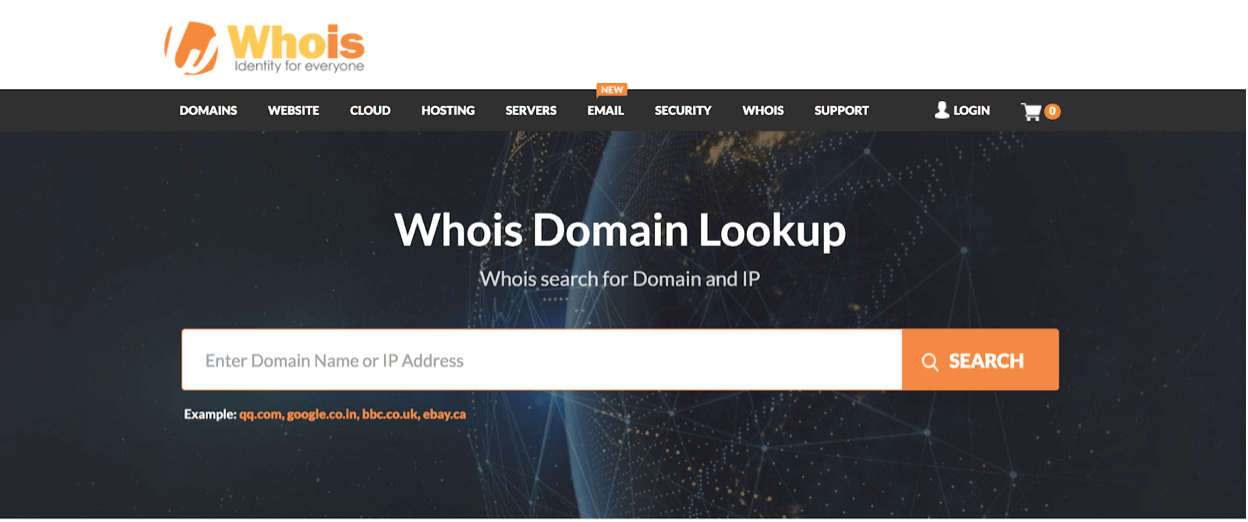
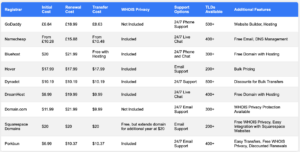



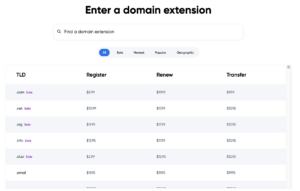


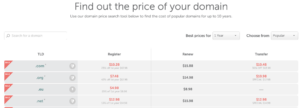
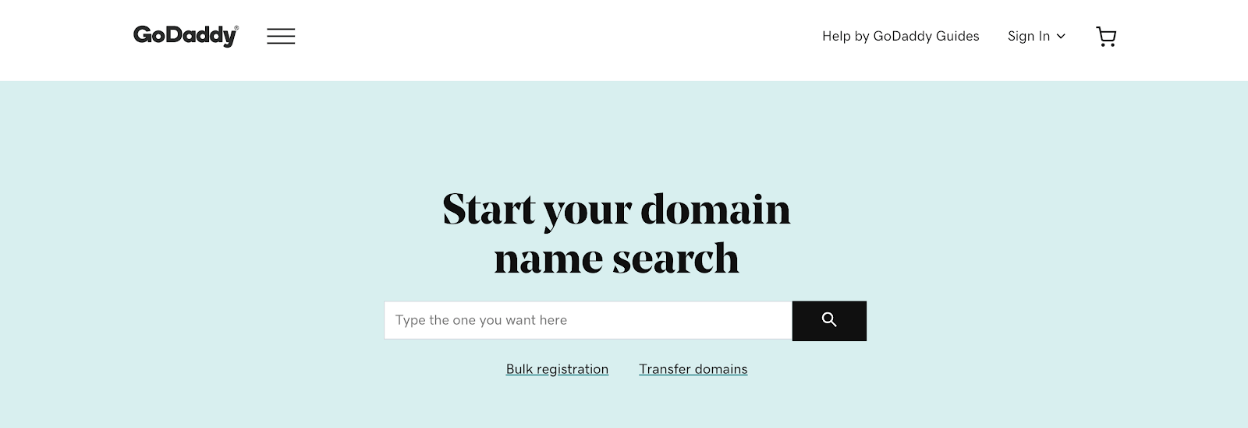
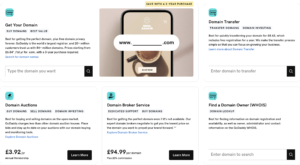


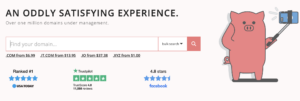
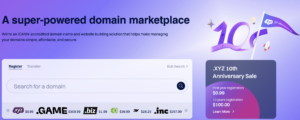

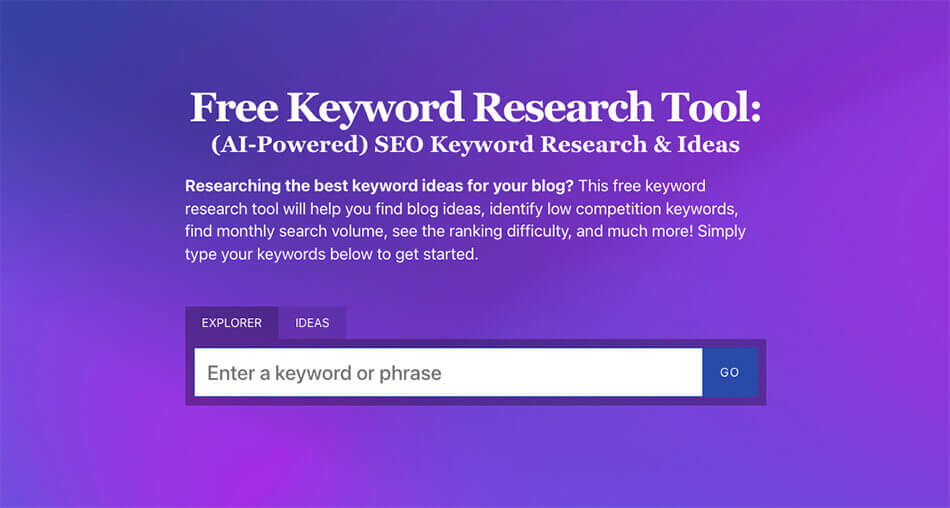
You seem to have left out an up and coming registrar. Cloudflare.
Since domain registrations are kind of a lost leader for CF and its CDN business many people don’t know they are now a registrar and do not mark up prices, renewals, or privacy.
Thanks for the suggestion, Charlie! I noticed when they rolled out their registration business, but have yet to to go through the actual registration process with them (which I’ll now do sooner than later so I can test it out) 🙏
Thank you for your article. I had some confusion. After reading your article it helps me to clear my ideas.
You’re welcome, Andy! Hope you found the right domain registrar for your needs 🙏
As a domain registrar, the .vote extension provides a way for bloggers to create websites that’ll encourage civic envolvement.
🙏
E-commerce is profitable